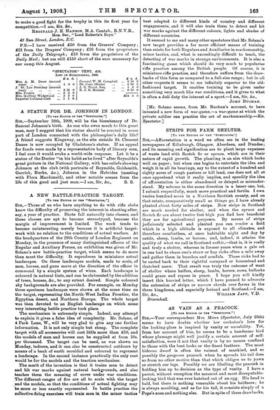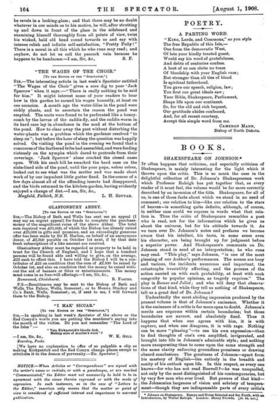AS VAIN AS A PEACOCK.
[To THR EDITOR OF TIM "SPRCTATOR."
SIR,—Your correspondent Mrs. Miers (Spectator, July 25th) seems to have doubts whether her cockatoo's love for the looking-glass is inspired by vanity or sociability. Yet, from her account of him, he seems to be a handsome bird whose plumage might well justify a certain amount of self- satisfaction, were it not that vanity is by no means confined to those with the beat looks or the finest feathers. The most hideous dwarf is often the vainest of mankind, and so possibly the gorgeous peacock when he spreads his tail does so from no other motive than that which obliges us to yawn or stretch our legs. Possibly we are libelling the peacock in bolding him up to derision as the type of vanity. I have a parrot, without exception the meanest and most disreputable- looking bird that was ever hatched out of an egg. His head is bald, but there is nothing venerable about his baldness ; he is always moulting, and as for his tail, it consists simply of a Pope's nose and nothing else. But in spite of these drawbacks,
he revels in a looking-glass ; and that there may be no doubt whatever in our minds as to his motive, he will, after• strutting up and down in front of the glass in the sideboard and examining himself thoroughly from all points of view, twist his wicked, bald old head round towards us and say with intense relish and infinite self-satisfaction, "Pretty Polly !" There is a moral in all this which he who runs may read; and anyhow, do not let us call the peacock vain because he
happens to be handsome.—I am, Sir, &c., S. F.



































 Previous page
Previous page